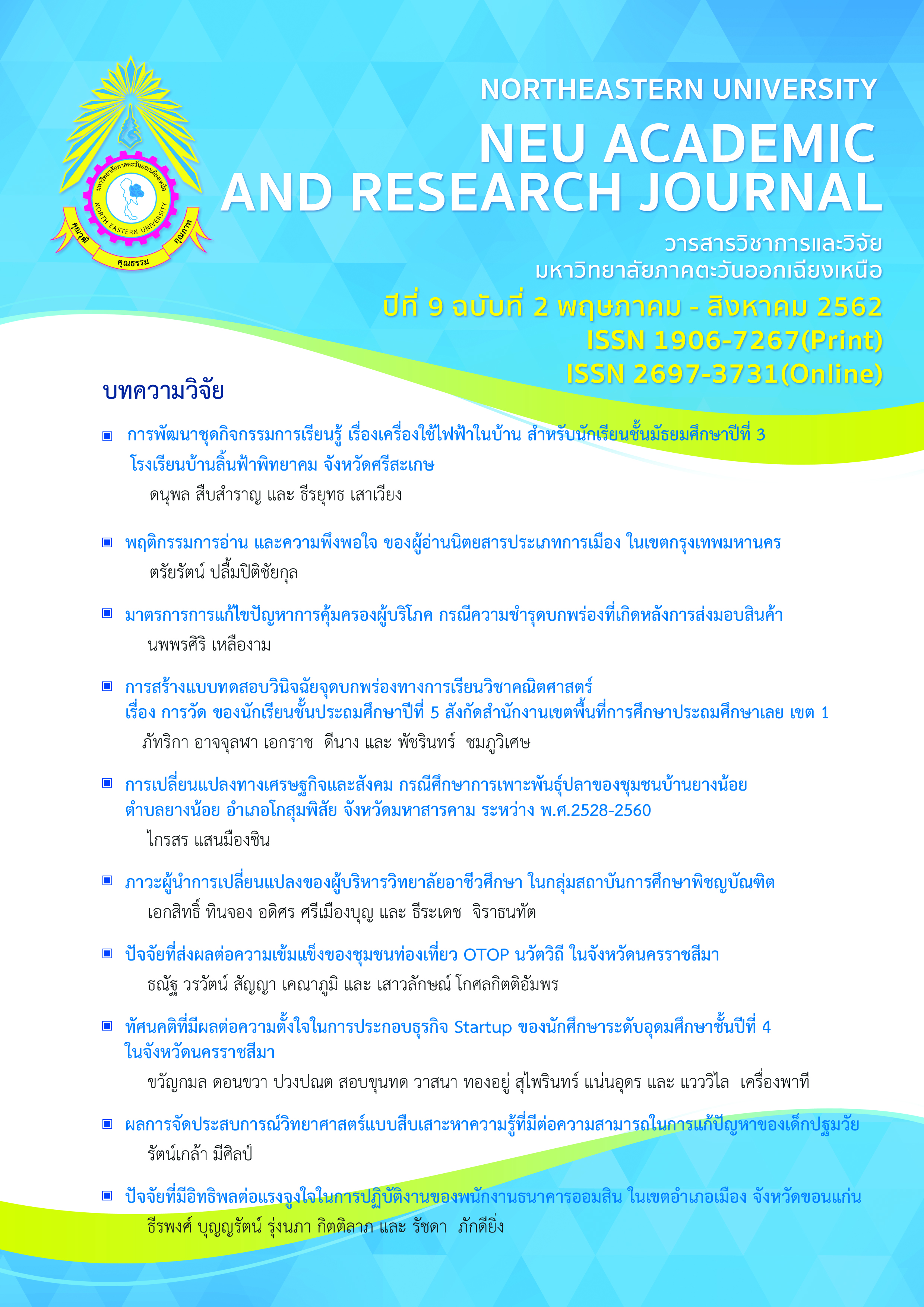ผลการจัดประสบการณ์วิทยาศาสตร์แบบสืบเสาะหาความรู้ที่มีต่อความสามารถในการแก้ปัญหา ของเด็กปฐมวัย
คำสำคัญ:
ความสามารถในการแก้ปัญหาเด็กปฐมวัย, การจัดประสบการณ์แบบสืบเสาะหาความรู้บทคัดย่อ
การวิจัยครั้งนี้มีวัตถุประสงค์ดังนี้ 1) เพื่อเปรียบเทียบความสามารถในการแก้ปัญหาของเด็กปฐมวัย ก่อนและหลังจัดประสบการณ์วิทยาศาสตร์แบบสืบเสาะหาความรู้ และ 2) เพื่อศึกษาความสามารถในการแก้ปัญหาของเด็กปฐมวัยที่ได้รับการจัดประสบการณ์วิทยาศาสตร์แบบสืบเสาะหาความรู้ กลุ่มตัวอย่างที่ใช้ในการวิจัยในครั้งนี้ ได้แก่ นักเรียนชั้นอนุบาลปีที่ 2 โรงเรียนบ้านทรัพย์มะนาว สังกัดสำนักงานเขตพื้นที่การศึกษาประถมศึกษากำแพงเพชร เขต 2 ภาคเรียนที่ 2 ปีการศึกษา 2559 จำนวนนักเรียน 18 คน ซึ่งได้มาโดยการสุ่มแบบกลุ่ม (Cluster Random Sampling) เครื่องมือที่ใช้ในการวิจัยครั้งนี้ ประกอบด้วย แผนการจัดประสบการณ์วิทยาศาสตร์แบบสืบเสาะหาความรู้ มีค่าเฉลี่ยความเหมาะสม อยู่ในระดับมาก ( = 4.39, S.D.= 0.16) และแบบวัดความสามารถในการแก้ปัญหาของเด็กปฐมวัย มีค่าความตรงด้วยดัชนี IOC เท่ากับ 0.67-1.00 และมีค่าความเชื่อมั่นด้วยวิธีการหาค่าดัชนีความสอดคล้องระหว่างผู้ประเมิน (RAI : Rater Agreement Index) เท่ากับ 0.86 วิเคราะห์ข้อมูลโดยการหาค่าเฉลี่ยส่วนเบี่ยงเบนมาตรฐาน และทดสอบสมมติฐานโดยใช้การทดสอบ The Wilcoxon Matched Pairs Singed-Ranks Test ผลการวิจัย พบว่า 1) เด็กปฐมวัยมีความสามารถในการแก้ปัญหา หลังการจัดประสบการณ์วิทยาศาสตร์แบบสืบเสาะหาความรู้ สูงกว่าก่อนจัดประสบการณ์อย่างมีนัยสำคัญทางสถิติที่ระดับ .05 และ 2) เด็กปฐมวัยมีความสามารถในการแก้ปัญหา ผ่านเกณฑ์ระดับดี จำนวน 15 คน คิดเป็นร้อยละ 83.33
เอกสารอ้างอิง
กรมวิชาการ. (2546). หลักสูตรการศึกษาปฐมวัย พุทธศักราช 2546. กรุงเทพฯ : ครุสภาลาดพร้าว.
กุลยา ตันติผลาชีวะ. (2551). การจัดกิจกรรมการเรียนรู้สำหรับเด็กปฐมวัย. กรุงเทพฯ : เบรน–เนสบุ๊คส์.
ชลสีต์ จันทาสี. (2543). การเปรียบเทียบผลสัมฤทธิ์ทางการเรียนวิทยาศาสตร์และความสามารถในการตัดสินใจอย่างสร้างสรรค์ของนักเรียนชั้นมัธยมศึกษาปีที่ 1 ที่สอนโดยใช้ชุดกิจกรรมการตัดสินใจทางวิทยาศาสตร์กับการสอนตามคู่มือครู. (วิทยานิพนธ์ปริญญามหาบัณฑิต, มหาวิทยาลัยศรีนครินทรวิโรฒประสานมิตร).
ทิศนา แขมมณี. (2551). ศาสตร์การสอน : องค์ความรู้เพื่อจัดกระบวนการเรียนรู้ที่มีประสิทธิภาพ (พิมพ์ครั้งที่ 8). กรุงเทพฯ : จุฬาลงกรณ์มหาวิทยาลัย.
พัชรี กัลยา. (2551). ความสามารถในการคิดเชิงเหตุผลของเด็กปฐมวัยที่ได้รับการจัดกิจกรรมเกมการศึกษามิติสัมพันธ์. (วิทยานิพนธ์ปริญญามหาบัณฑิต, มหาวิทยาลัยศรีนครินทรวิโรฒ).
พันทิพา บุญสรรค์. (2550). การเปรียบเทียบผลสัมฤทธิ์ทางการเรียน ความสามารถในการคิดวิเคราะห์และการให้เหตุผลของนักเรียนชั้นประถมศึกษาปีที่ 4 เรื่องเศษส่วนและทศนิยมกลุ่มสาระการเรียนรู้คณิตศาสตร์ ระหว่างการจัดกิจกรรมการเรียนรู้แบบสืบเสาะหาความรู้กับการจัดกิจกรรมการเรียนรู้แบบปกติ. (วิทยานิพนธ์ปริญญามหาบัณฑิต, มหาวิทยาลัยมหาสารคาม).
มาริสา วงศ์สุกรรม. (2553). การเปรียบเทียบความสามารถในการแก้ปัญหาและความฉลาดทางอารมณ์ของ เด็กปฐมวัยที่ได้รับการจัดประสบการณ์แบบโครงการกับแบบสืบเสาะหาความรู้. (วิทยานิพนธ์ ปริญญามหาบัณฑิต, มหาวิทยาลัยราชภัฏพระนครศรีอยุธยา).
วีรยุทธ วิเชียรโชติ. (2547). เทคนิคการเรียนการสอนแบบอารยวิถีในกระบวนวิธีสืบสวน-สอบสวนเพื่อการพัฒนา “เบญจลักษณะ”. กรุงเทพฯ : ก้าวใหม่.
สิริมา ภิญโญอนันตพงษ์. (2538). แนวคิดสู่แนวปฏิบัติแนวการจัดประสบการณ์ปฐมวัยศึกษา(หลักสูตรการศึกษาปฐมวัย). กรุงเทพฯ : ดวงกมล.
อารีย์ บุญฤทธิ์. (2549). ความคิดสร้างสรรค์ของเด็กปฐมวัยที่ได้รับการจัดประสบการณ์เน้นทักษะกระบวนการทางวิทยาศาสตร์กับการจัดกิจกรรมตามแผนการจัดประสบการณ์หลักสูตรการศึกษาปฐมวัย พุทธศักราช 2546. (วิทยานิพนธ์ปริญญามหาบัณฑิต, มหาวิทยาลัยราชภัฏเทพสตรี).
Bruner, J.S. (1969). The Process of Education. New York: Harvard University Press.
Dewey, J. (1933). How We Think. Boston D.c.: Heath and Co.



